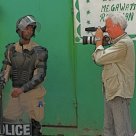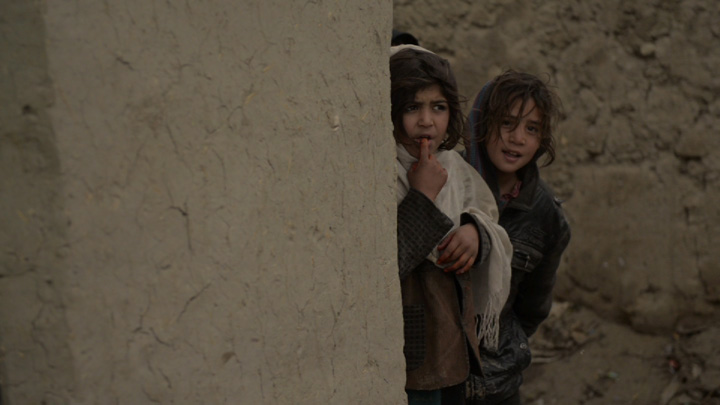Marzia was fearless, fully composed, gritty, emphatic about what needed to be done to achieve women’s rights in Afghanistan. In short, a thoroughly modern Afghan woman.

We were in the courtyard of a secure compound in the heart of Kabul, Afghanistan’s capital, behind a 15-foot wall topped by barbed wire — armed guards only a few metres away. Helicopters flew low overhead, and Marzia paused in mid-sentence in her interview with correspondent Mellissa Fung to let the choppers pass.
The interview over, I approached her to say “thank you” and I reached out to shake her hand.
READ MORE: Losing Afghanistan: A close-up look at the plight of women caught in a cycle of violence
Instinctively Marzia pulled back. “I cannot shake your hand,” she said. She could see my confusion. She smiled, shrugged apologetically, and I absorbed my first lesson in Islamic gender culture: men and women as a rule do not touch one another, unless they are husband and wife or family, or unless there is an urgent reason for contact. Otherwise, a casual touch is a violation of personal space, an act of immodesty.
There is some sacred writing in Islam that quotes the Prophet, to the effect that “it is better to be stabbed in the head with an iron needle” than to touch the hand of a woman who is “not permissible to you.”
In the West, it’s called haptics—non-verbal communication using touch. A handshake, a hand on the shoulder, grasping somebody’s elbow — all actions we take for granted, forgetting how powerful they are as forms of expression. In some Eastern cultures, however, this kind of touch is a gesture of extreme intimacy.
Haptics can take some wonderful forms. Years ago, in south Sudan, I met a tribal chief who greeted visitors by spitting lightly on their foreheads, and then gently rubbing the spittle in their hair. It’s a gesture of benevolence and respect, in a culture where any moisture is precious. “Here, I share my water with you.”
READ MORE: Losing Afghanistan: The worst place in the world to be a widow
I guess that, having my handshake rejected in Kabul, I could have fulminated about how patriarchy in Islamic countries casts women as inferiors and renders them untouchable. But having met Marzia, I know that would have been a big mistake. There wasn’t an inferior bone in her body.
An appreciation of haptics across different cultures: Something every traveler should carry in his or her kit bag.
An ultra-marathon in a nation at war
Dave, our host in Kabul, is a high-achieving athlete. He’s planning a charity event—a 100-kilometre 24-hour ultra-marathon to raise money for a young Afghan girl with a rare blood disease. The BBC will be there, along with local television.
Do I want to see the course? I certainly do. I imagine a drive into the country, through mountain passes populated by shepherds with Kalashnikovs. Imagine that. An ultra-marathon in a nation at war, where IED explosions and suicide attacks and kidnappings are an everyday occurrence! What kind of madness is this?
“Come with me,” Dave said. He’s carrying an armful of coloured plastic cones, and he starts placing them at intervals around the courtyard of the compound where we are staying. Then, he leads me through a doorway, and up five flights of stairs of the main building. Then down a long hallway, through a room, and back down five flights of stairs, and back around the parking lot and around the courtyard again
It’s an ultra-marathon inside a security cocoon. Total distance of the course: 875 metres. One hundred and fourteen circuits of 875 metres in a walled compound in the heart of Kabul equals 100 kilometres. Was I up for it?
Sorry Dave. I left my running shoes at home.
“Our drivers are trained to use their vehicles as a weapon.”
That’s meant to be reassuring as you’re driving down a dark highway in eastern Afghanistan, in a region known for Taliban and so-called Islamic State activity. It isn’t reassuring. After all, I’m inside this weapon. And this weapon isn’t bulletproof.

Our security consultant, however, looks bulletproof and that is reassuring. Ex-military. Taciturn. Yoke-like shoulders and jaw like a brick. He doesn’t tell you: “I wouldn’t go down that road if I were you.” He says: “You’re not going there. Period.” You don’t argue with a guy who emailed you a security advisory this morning that began: “INS have reportedly facilitated a number of suicide attackers into Kabul . . .” INS stands for insurgents. Everybody knows that means Taliban.
At night we sleep behind an iron door that could stop a truck. In the event that someone is able to penetrate the 15-foot walls, there are two “safe haven” rooms within easy reach. If we want to leave the compound, a reconnaissance team scouts out our destination beforehand to make sure it’s safe.
I find a Western-style grocery store with an ATM. I walk through a checkpoint, and I’m carefully frisked. Why the fuss, I ask my security guy? “This is the finest supermarket,” I’m told. “Four years ago, a suicide bomber came in here and blew himself up. Eight people killed. Two Canadians injured.”
The Taliban said they were targeting “foreign occupiers.” I guess that could include me. I quickly climb back into the vehicle. My weapon.
16×9’s “Losing Afghanistan” airs Saturday, Dec. 12, 2015 at 7pm.





Comments